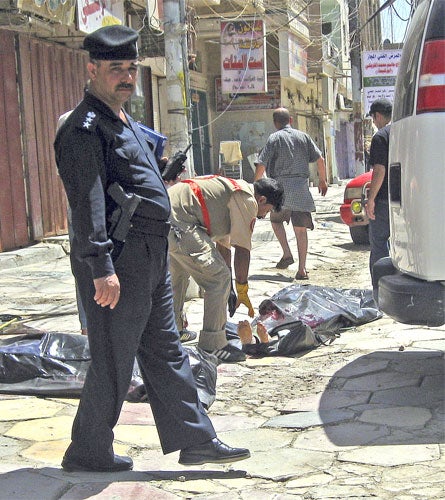Baghdad's fragile peace shattered by deadly jewellery raid

Masked gunmen killed 15 people in an armed robbery on a gold jewellery market in Baghdad yesterday, reinforcing a sense of unease that the improvement in security over the last couple of years might be reversed.
Witnesses said there were between 15 and 20 attackers in five or six cars. They were heavily armed, carrying rocket propelled grenades, machine guns and pistols.
The gang arrived in the south-western district of Baiyaa at 11.20am, wearing Arab head-dresses wrapped round their faces. Their targets were 12 gold shops in two buildings at the end of a busy market street.
Opening fire, the robbers killed nine goldsmiths and two bystanders before breaking open glass cases in which gold jewellery was on display. The attackers also let off a bomb which killed four people.
Eyewitnesses said that no policemen turned up for 15 minutes and when one did arrive, he was shot in the leg and shoulder. The security forces are only said to have arrived after half an hour.
A Baghdad security spokesman, Major-General Qassim al-Moussawi, blamed insurgents linked to al-Qa'ida for the attacks. "It's a terrorist incident linked to the crimes conducted by al-Qa'ida to gain financing through armed robbery and stealing," he said.
The involvement of the Sunni fanatics of al-Qa'ida is possible – and they are known to be short of money – but it is unlikely because Baiyaa is an overwhelmingly Shia area from which the Sunni were expelled in the sectarian civil war of 2006-7.
Crime in Iraq is often carried out by present or former members of paramilitary groups who have no hesitation in shooting their victims or anybody who gets in their way.
In one robbery last July, members of the presidential guard, which protects senior leaders, broke into the government-owned Rafidain Bank and stole almost $5m. They shot dead one guard and tied up seven others.
The jewellery robbery in Baiyaa followed closely on the assassination of a member of the newly-elected parliament in the northern city of Mosul.
The killing of Bashar Mohammed Hamid Ahmed, a 32-year-old mill owner, outside his house may be a sign of growing instability in Iraq because of the continuing failure to agree a new government three months after the general election.
Mr Ahmed was a member of the Iraqiya party, led by the former prime minister Iyad Allawi, which won the largest number of seats in the new parliament and was overwhelmingly supported by the Sunni Arab community.
Ever since, it has complained of persecution and Mr Ahmed had no official bodyguards to protect him because these will only be allocated when the new parliament is sworn in.
"Iraqiya is now the target for the terrorist powers and unfortunately for the government also," said Osama al-Nujaifi, a powerful politician from Mosul. "There must be a way to protect Iraqiya."
The results of the election, held on 7 March, have still not been certified so it will be a long time before a new government is formed.
The political stalemate is creating fear in Baghdad that state authority is waning as the lame-duck government of the Prime Minister Nouri al-Maliki clings on to power.
"The whole political class is terrible," said one former minister. "All they think about is jobs for themselves and how far they can rob the state."
Mr Allawi has repeatedly warned that any attempt to keep his winning coalition out could spark bloodshed.
"I can't anticipate what may happen if there is a government without Iraqiya," he said yesterday in an interview on al-Jazeera television. "But I expect it will be a very dangerous scenario. More than anticipated."
There is an increasing likelihood that Mr Maliki will remain Prime Minister because his opponents among the other Shia parties cannot put forward a credible alternative.
The followers of the Shia cleric Muqtada al-Sadr, who did well in the election, are still demanding that Mr Maliki be replaced but Iran, which supports the Shia parties, is believed to be willing to see him stay in office.
If he does so, the Sadrists will try to ensure that his ability to act alone is brought under control.
The inability to form a new government means small as well as well large decisions are not being taken.
One politician complained that he has not been able to renew his bodyguards' gun licences, because no official could be found to sign the permits.
Subscribe to Independent Premium to bookmark this article
Want to bookmark your favourite articles and stories to read or reference later? Start your Independent Premium subscription today.

Join our commenting forum
Join thought-provoking conversations, follow other Independent readers and see their replies